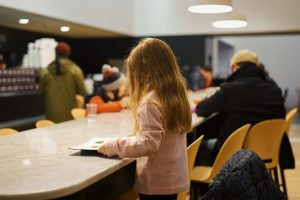Libraries are playing a crucial role in the community. As a “palace for the people”, libraries are a place where people are welcome regardless of however they may identify, they have the ability and opportunity to be in society as a welcome participant (Stephens, 2022; Lauersen, 2020). Embraced as part of the library is the ability to foster lifelong learning, and the library is an extension of learning beyond the classroom whether or not an individual knows it or not. Libraries are seen as a place of knowledge, but there is rich knowledge beyond the books that are available at the library. Built into libraries are dynamic centers full of lifelong learning and resources beyond books and access to diverse environment of people (Stephens, 2014).
When libraries prioritize learning, it builds a holistic experience for its users. There are so many services that available to the public, however, I think that it is the informal learning that takes place that is essential to why these services are so powerful.

Due to libraries, learning has become a lot more accessible to everyone. As spaces for collaboration, physical and digital resources, and programs, the community can come to together to participate in the space (Nygren, 2014). At times, these services are primary sources of information for those that may not readily have access to these resources due to financial, technological, or even geographical limitations to name a few. This open access is often vital as there is so much power in connection, collaboration and development that takes place.
Currently in my library system, we had a cybersecurity breach and it forced things to shut down, specifically technology. We are still undergoing the effects of this, and there is still no access to technology. When I say technology, this means no computers, laptops, printing, or even proper access to our library catalogues. This has forced me to take a step back and see just how valuable those resources are. But this has also forced me to see how much learning can also take place without it.
While it sucks that there is no technology available, it has caused things to slow down. I think it is causing all library staff to look at the library in a different way. We are so used to combatting the effects of the digital and technology divide, with constantly helping and promoting digital literacy, and providing those skills needed to navigate the world of modern technology and keep up with the ever changing and evolving nature of technology and technology trends. While that is extremely valuable, and an important part of library services, I think now I am truly seeing the collaboration, creativity, and compassion coming through.
There has been a bunch of new ways to use the library through this forced shut down and limited services. I am seeing the library truly transition into a place where learning is often more than just about consuming information or using a service or resource; it’s about connecting, creating, and engaging with others. Often times, I see this happen during programs or events, but now it is becoming a daily recurrence. There is greater opportunities for people of various backgrounds and different interests to come together and share knowledge, exchange ideas, and learn from one another. I think as library staff, that is something we sometimes forget the importance of communication and how that builds into fostering the library experience. It is through that communication that so much learning can take place.
Communication can bring information sharing, support, connection, and help break down barriers (Dutta, 2020) . Being a space where open communication can be facilitated and encourages, so much collaboration and information can be shared, as well, library workers are able to navigate the needs of patrons better (Dutta, 2020). For example, in baby programs, by asking a simple question, I am able to facilitate and encourage moms to share tips and tricks that they have with parenting and/or parenting resources. Communication is crucial to the library, and it can help address any barriers that might be present in information, services, and skills that people need. Knowledge and learning is everywhere, and when combined with communication, individuals can feel empowered to pursue, and equip themselves with the skills they need whether it is through more formal avenues such as programs or events, or through informal learning such as talking with one another.
When libraries prioritize learning with clear, open, and accessible communication, they can nurture a environment that provides that holistic experience for all. Libraries can position themselves as learning spaces that can take on situations such as learning for all ages, digital and media literacy, supporting development for youth, workers, and education, and build a community that values lifelong learning (Nygren, 2014). Communication is the key that can help learning happen and let the library fulfill its role as not only a space for information but a place where that information can take an individual to new heights.
References
Dutta, A. (2020). Role of Communication Skills in Effective Management of Library and Information Centres. ResearchGate. https://www.researchgate.net/publication/351587761_Role_of_Communication_Skills_in_Effective_Management_of_Library_and_Information_Centres
Lauersen, C. (2020, June 24). Learning, culture, community and Diversity: New library strategy for roskilde libraries 2020 –. The Library Lab. https://christianlauersen.net/2020/06/23/learning-culture-community-and-diversity-new-library-strategy-for-roskilde-libraries-2020/
Nygren, Å. (2014). The public library as a community hub for connected learning. https://library.ifla.org/id/eprint/1014/1/167-nygren-en.pdf
Stephens, M. (2014). Making the Case for the Library as Space for Infinite Learning. https://www.dropbox.com/scl/fi/4zt1yliwb2ffzr8euix2p/YLibraryInfiniteLearning.pdf?rlkey=m0v6lkd43ufilkp5aktawhlpr&e=1&dl=0
Stephens, M. (2022). Hyperlinked library master lectures 2022: The hyperlinked library participatory service & transparency [Course presentation]. School of Information, San Jose State University. https://sjsu-ischool.hosted.panopto.com/Panopto/Pages/Viewer.aspx?id=2a19a4b6-e945-4d2e-abf1-aef3014172a5
@jemielyn Everyone is so focused on tech in libraries now, but that isn’t the cure for everything. As you said, simple communication and speaking to one another goes a long way and is super important. That’s how we connect and learn from one another. I’m sorry for the security breach at your library, because that is awful – but I’m glad that it helped you reflect and learn more about your library.